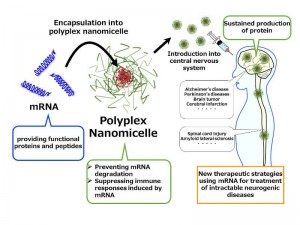In vivo mRNA introduction into central nervous system A new category of nucleic acid medicine

Central nervous system (CNS) disorders including those of the brain and spinal cord are difficult to cure completely. Messenger RNA (mRNA) is a promising treatment candidate due to its capability to express functional proteins in neural cells in a safe and sustained manner. However, the instability of mRNA under physiological conditions and the strong immune response induced by mRNA have hampered its clinical application.
In this study, a research group in the University of Tokyo (Prof. Kazunori Kataoka and Assoc. Prof. Keiji Itaka in the Graduate School of Engineering and Graduate School of Medicine) achieved effective introduction of mRNA into the CNS using their original drug delivery system (DDS) employing polyplex nanomicelles. The nanomicelle has characteristic core?shell architecture based on self-assembly of block copolymers composed of polyethylene glycol (PEG) and polyamino acids, providing high stability and stealth properties in the body.
After introduction of mRNA-containing nanomicelles into the CNS, sustained protein expression from the mRNA was obtained for almost a week. Immune responses to the mRNA were effectively suppressed, where the recognition of mRNA by toll-like receptors in the endosomes was avoided by the use of the nanomicelle.
This system for the first time achieved the safe and effective introduction of mRNA into the CNS. This system is available for various CNS disorders including Alzheimer’s disease, opening the door to a new nucleic acid medicine using mRNA.
Press release [pdf] (Japanese)
Paper
Satoshi Uchida, Keiji Itaka, Hirokuni Uchida, Kentaro Hayakawa, Toru Ogata, Takehiko Ishii, Shigeto Fukushima, Kensuke Osada, Kazunori Kataoka,
“In Vivo Messenger RNA Introduction into the Central Nervous System Using Polyplex Nanomicelle”,
PLoS ONE 8(2): e56220. doi: 10.1371/journal.pone.0056220.
Article link
Links
Graduate School of Engineering
Department of Materials Engineering, Graduate School of Engineering
Clinical Biotechnology Laboratory
The University of Tokyo Global COE Center for Medical System Innovation








